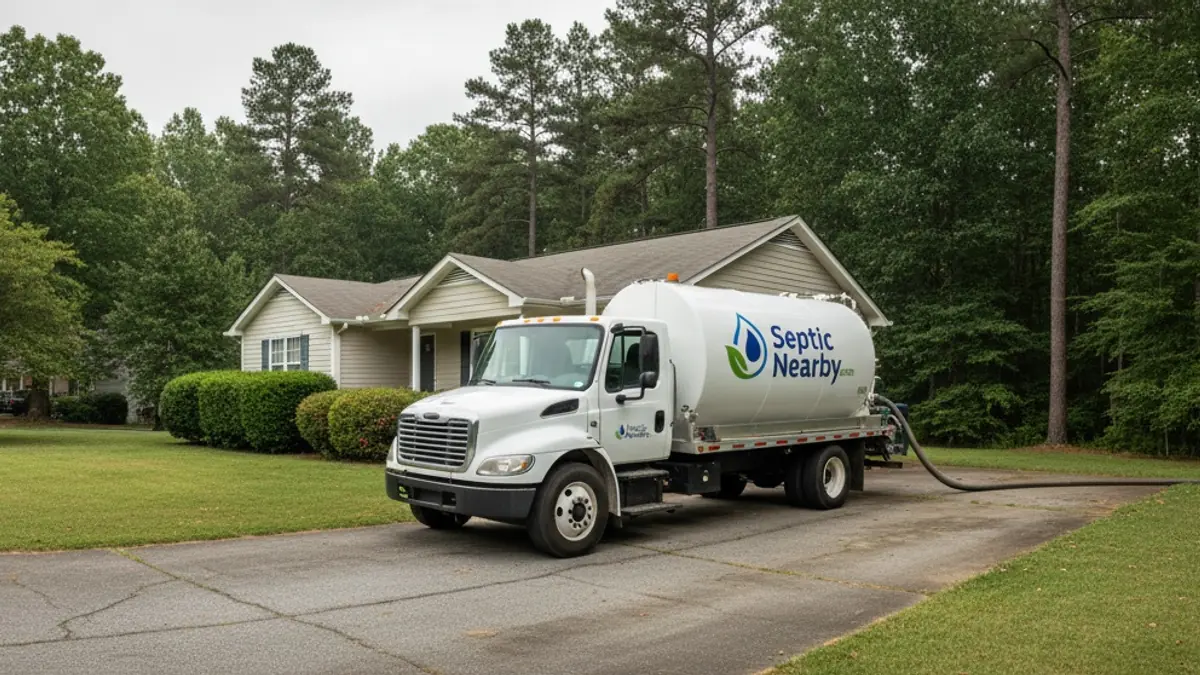Septic Pumping Services in Wayne County, GA
 Photo Illustrative
Photo Illustrative+1-470-9-SEPTIC
Operators available 7 AM - 9 PM
Licensed & Insured • No Obligation • Emergency Service Available
Cities We Serve in Wayne County
Local Septic System Factors in Wayne County
Your Guide to Septic Systems in Wayne County, GA
Working a septic system in Wayne County is straightforward if you know the local ground. From the sandy lots in Jesup to the clay-heavy soil out past Screven, every system behaves differently. We’ve been digging, pumping, and repairing these systems for years. This isn't textbook theory; it's field-proven knowledge.
Most homes outside the city limits of Jesup or Odum rely on an onsite system. That means you are your own wastewater manager. Your system has two main parts: the tank and the drain field, also called a leach field. The tank separates solids from liquids. The leach field lets treated wastewater seep safely into the ground. Simple, effective, and reliable when maintained.
But our local conditions add a twist. The humid subtropical climate means we get a lot of rain, especially in the summer. A heavy downpour can saturate your leach field, leaving wastewater with nowhere to go. This is when you get backups. We see it all the time. Proper grading and a healthy system are your best defense.
Access is another major factor here. Many properties have long driveways or are set back from the road. Getting a heavy pump truck into position requires a clear, solid path. We have to consider driveway access before we even start a job. If your tank lid is buried and we can’t get the truck close, a simple pump-out becomes a much bigger project. Knowing where your clean-out and tank lid are saves time and money.
Older homes, especially those built before modern codes, often have undersized tanks or failing drain fields made of materials we no longer use. Newer systems are designed better but still face challenges from our soil. Some areas have excellent percolation, while others are slow to drain. A soil evaluation is key for any new installation or major repair, and it’s something the Wayne Board of Health will require.
Understanding your system starts with knowing its components. The tank holds the waste, where bacteria break down solids into sludge. Baffles inside the tank prevent solids from flowing out and clogging the leach field. The leach field is a network of perforated pipes in gravel-filled trenches. It's the most expensive part of your system and the part most easily damaged by neglect.
Regular maintenance is not optional. It's insurance. A failed leach field is a costly, messy problem that can contaminate your property. A simple pump-out every few years costs a fraction of a full system replacement. This guide will walk you through the specifics for Wayne County.
Frequently Asked Questions in Wayne County
Key septic regulations in Wayne
The Wayne Board of Health's Environmental Health section oversees all septic systems. You must obtain a permit from them for any new installation or for significant repairs like replacing the tank or the leach field. Routine maintenance, such as pumping the tank, does not require a permit.
Average pumping cost across Wayne
Pumping costs in Wayne County typically range from $325 to $550. The price varies based on your location and the job's difficulty. Factors include the distance the pump truck has to travel from its base in Jesup, the ease of driveway access, and whether we have to manually dig to uncover the tank lid.
How often to pump septic systems in the county?
The standard recommendation is every 3 to 5 years. However, in Wayne County, it's best to err on the side of caution. If your home has high occupancy, a garbage disposal, or is located in an area with a high water table or poor-draining clay loam soil, you should stick to a 3-year schedule.
Weather and scheduling in Wayne
The summer and early fall are our wettest seasons. Heavy rain saturates the soil, which can stress your leach field and make it difficult for our trucks to access your property. We recommend scheduling routine pumping and inspections during the drier months of spring and late fall for best results.